
Market Information > Çѱ¹ ³ó½ÄÇ° ½ÃÀå´º½º
Çѱ¹ ³ó½ÄÇ° ½ÃÀå´º½º
February 2011
2011.03.07
For Coverage: February 2011
President Cabinet Meeting Approves Additional Agreements of KORUS FTA [Korean, OSY]
http://www.yonhapnews.co.kr/politics/2011/02/07/0501000000AKR20110207188851001.HTML?template=2088
Summary: ROKG cabinet meeting on Feb. 8 approved the results of additional FTA negotiation with the
S. Korea
http://english.yonhapnews.co.kr/national/2011/02/08/47/0301000000AEN20110208011900315F.HTML
Summary:
Cabinet OKs supplementary
http://www.koreaherald.com/business/Detail.jsp?newsMLId=20110208000599
Summary: The Cabinet on Tuesday endorsed a supplementary agreement to the free trade deal concluded between
EU Parliamentary panel endorses
http://www.koreaherald.com/common/redirect.jsp?category_id=020201000000&news_id=20110208000597
Summary:
http://www.seoul.co.kr/news/newsView.php?id=20110201005010
Summary: According to Inside U.S. Trade, the Obama administration is expected to send the KORUS FTA package to the Congress at the end of March or April and the actual vote within the Congress is expected to take place sometime in May.
Gov¡¯t – Ruling Party Agree to Bring Korea-EU FTA Bill to the National Assembly in February [
Summary: In a meeting held on February 9, the ruling party and the government agreed to bring the Korea-EU Free Trade Agreement Bill to the national assembly in February. The meeting came to a consensus that
Korea-U.S. Free Trade Agreement Faces More Hurdles [English, CSY]
http://english.chosun.com/site/data/html_dir/2011/02/09/2011020900794.html
Summary: The FTA still needs to be ratified by lawmakers in both countries, but the prospects that the National Assembly will approve them are slim. The government and ruling Grand National Party are saying that very few additions have been made and the original text of the FTA has not been touched, making it possible to ratify the supplementary agreements along with the existing FTA that has already been passed by the National Assembly
http://english.yonhapnews.co.kr/national/2011/02/09/61/0301000000AEN20110209009700315F.HTML
Summary: The South Korean government and the ruling party on Wednesday decided to prioritize the nation
http://joongangdaily.joins.com/article/view.asp?aid=2932058
Summary:
Obama to Push for Ratification of Korea-U.S. FTA [English, CSY]
http://english.chosun.com/site/data/html_dir/2011/02/11/2011021100331.html
Full text: U.S. President Barack Obama will submit the Korea-U.S. free trade agreement bill to Congress late this month or early next month in the hope that Congress will approve it this spring, U.S. Trade Representative Ron Kirk said Wednesday. Kirk made the announcement in a hearing of the
Korean PM: KORUS FTA Not Optional, But Vital to Economy [English, CSY]
http://www.arirang.co.kr/News/News_View.asp?nseq=112499&code=Ne4&category=3
Full text:
To the National Assemblymen that came to
http://www.hankyung.com/news/app/newsview.php?aid=2011021321721
Summary: This is a summary of a commentary written by former
Democratic Party Refutes Ruling Party¡¯s Statement on KORUS FTA [Korean: BYK]
http://www.asiatoday.co.kr/news/view.asp?seq=449322
Summary: The Head of the Democratic Party, Hak Gyu Sohn refuted the statement by Kyung Pil
Cabinet approved additional KORUS FTA deal [Korean: BYK]
http://www.nongmin.com/article/ar_detail.htm?ar_id=183691&subMenu=articletotal
Summary: President Lee held a cabinet meeting on Feb 8 and approved the additional KORUS FTA deal. The Administration will soon submit this bill to the national Assembly to get it ratified.
U.S. Secretary of Treasury states ¡°Will put in efforts to open Korean beef market further.¡± [Korean: BYK]
http://www.ytn.co.kr/_ln/0104_201102170750356864
Summary: Tim Geithner, Secretary of Treasury stated that the
European parliament to vote on Korea-EU FTA U [Korean: BYK]
http://news.mk.co.kr/v3/view.php?year=2011&no=102105
Summary: The European parliament will vote on the Korea-EU FTA bill on February 17th. This agreement is likely to pass the parliament without any problems.
EU Parliament approves
http://joongangdaily.joins.com/article/view.asp?aid=2932383
Summary: The European Parliament approved a free trade pact with
S. Korean biz group urges early approval of Korea-EU FTA [English, CSY]
http://english.yonhapnews.co.kr/business/2011/02/18/33/0502000000AEN20110218004100320F.HTML
Full text: The Federation of Korean Industries (FKI), South Korea
DDA talks that can affect
http://english.yonhapnews.co.kr/business/2011/02/23/0502000000AEN20110223012600320.HTML
Summary: The long-delayed Doha Development Agenda (DDA) that can affect
National Assembly targeting March 9th as the date for voting on Korea-EU FTA [Korean: BYK]
http://news.naver.com/main/read.nhn?mode=LSD&mid=sec&sid1=100&oid=001&aid=0004928205
Summary: The National Assembly is targeting March 9th as the date that it will vote on ratifying the Korea-EU FTA. Both ruling and opposition parties have agreed to discuss this at the Standing Committee on Foreign Affairs and Unification on March 3. The ruling party plans to send it over to the Standing committee on legal affairs for its review on March 7-8, 2011. Afterwards, it will submit the FTA bill to the general floor for voting. However, the opposition party is stating that it would not have sufficient time to review the bill during this session and that it probably will have to be put off until the next session to allow for more intensive review.
Food prices were second highest in OECD group (English, CSY)
http://joongangdaily.joins.com/article/view.asp?aid=2931833
Summary:
Among the 33 surveyed countries,
Inflation surges last month on food prices (English, CSY)
http://joongangdaily.joins.com/article/view.asp?aid=2931788
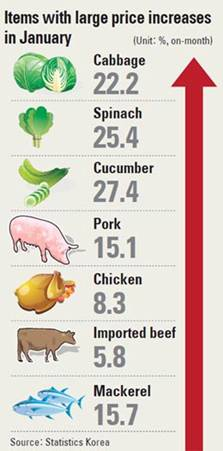
Unusually cold weather and heavy snow have further contributed to increases in the price of cabbage, cucumber and green onion by 22.2 percent, 27.4 percent and 15.7 percent, respectively. With the rise in pork prices, the price of substitute meats such as chicken and beef also increased. The price of chicken climbed 8.3 percent, while the price for imported beef increased 5.8 percent. The rise in crude oil prices led to a price increase at the pump for car owners.
[Analysis] Why are food prices in
http://english.donga.com/srv/service.php3?bicode=020000&biid=2011020852848
Summary: A low food self-sufficiency rate and poor distribution structure are fueling food inflation in
Prices of 66% of Daily Items Rose in Jan. [English, MGF]
http://world.kbs.co.kr/english/news/news_Ec_detail.htm?No=79398
Prices of 66 percent of daily necessities rose last month despite government-wide efforts to curb inflation. The Korea Consumer Agency surveyed prices of 80 daily necessities in January and reported that 53 of them saw price hikes since December. Only 30 percent of the items have seen price drop, while two-and-a-half percent remained unchanged. The results show that curbing inflation in the nation appears to be challenging. The government had declared a war on consumer prices and announced to freeze public utility fees while clamping down on price fixing practices.
Prices for necessities on the upswing [English, CSY]
http://joongangdaily.joins.com/article/view.asp?aid=2932152
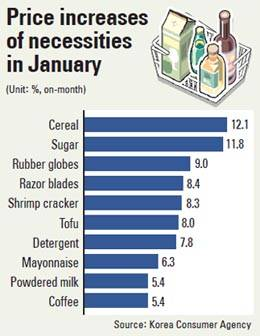
http://english.yonhapnews.co.kr/business/2011/02/10/21/0503000000AEN20110210011700320F.HTML
Summary:
http://english.yonhapnews.co.kr/business/2011/02/14/59/0502000000AEN20110214004300320F.HTML
Summary:
Import prices hit 23-month high [English, CSY]
Economists forecast inflation will reach consumers¡¯ pocketbooks by the spring
http://joongangdaily.joins.com/article/view.asp?aid=2932320
Summary: Most Chinese restaurants located in Jongro, central
http://economy.donga.com/Economy_RealTime/3/01/20110223/35041341/3&top=1
Summary: Each month, 148 surveyors under the Korea Statistics Office visits 22,000 retail stores in 37 local cities and check the prices of 489 designated products. Price information gathered is sent to headquarter via PDA on the spot. After review by headquarter, the price information is put together into the consumer price index. In the calculation of the index, prices of different cities and product categories are weighted differently to come up with the final index that can better represent the average market price in
Yoon issues new inflation warning on oil price rise [English, CSY]
http://joongangdaily.joins.com/article/view.asp?aid=2932662
Summary: Finance Minister Yoon Jeung-hyun yesterday warned that surging inflation could reduce global demand and slow
http://english.chosun.com/site/data/html_dir/2011/02/24/2011022401214.html
Summary: Some figures in the Korea-EU FTA submitted by the government to the National Assembly in October last year are different from the English-language original, it emerged Wednesday. The Ministry of Foreign Affairs and Trade admitted the mistake, but lawmakers are angry that it pushed for ratification without correcting them. Park Joo-sun of the main opposition Democratic Party on Wednesday said the ministry made a mistake in the course of translating the FTA into Korean and mistyped the percentage of non-originating material permitted for toys and wax goods at 40 percent and 20 percent respectively instead of 50 percent. "If this version had been ratified, we
http://www.koreatimes.co.kr/www/news/nation/2011/02/116_82033.html
Full text:
Higher food costs hurt sentiment [English, CSY]
Outlook is the weakest since May 2009
http://joongangdaily.joins.com/article/view.asp?aid=2932694
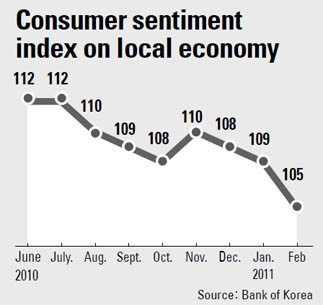
http://english.yonhapnews.co.kr/business/2011/02/27/65/0501000000AEN20110227000500320F.HTML
Summary:
Worries Arise over Possible Global-wide Grain Crisis ¡¦ Korean Gov¡¯t and Industry Are Not Prepared [Korean, OSY]
http://www.hankyung.com/news/app/newsview.php?aid=2011021054361&sid=010503&nid=005<ype=1
Summary: While price of grains are continuing a rapid increase due to reduced supply and inflation pressure, it is pointed that Korean government and industry are not prepared to cope with the possible crisis. According to a news report, Korean government maintains no bumper grain stock currently other than rice. Industry has also been very passive in developing stable supply of grains internationally. For example, there is only one Korean company (Hyundai Heavy Industry Co.) that is currently operating farm in foreign country (
http://world.kbs.co.kr/english/news/news_Ec_detail.htm?No=79408
The Agriculture Ministry will sell from Monday through March 18th a disaster insurance plan for farmers at agro cooperative associations nationwide for five fruit items. The five fruits are apples, pears, oranges and two types of persimmon. The scheme will mainly insure the farmers against typhoon, wind and hail damage, but farmers can also arrange separate coverage for extreme cold or flooding.
Possible Crisis in the International Wheat Supply as
http://www.hankyung.com/news/app/newsview.php?aid=2011021454461&sid=0101&nid=002<ype=1
Summary: South China Morning Post (SCMP) reported on Feb. 14 that
Report Says 10% of Rice in
http://www.hankyung.com/news/app/newsview.php?aid=2011021594291&sid=0105&nid=005<ype=1
Summary: A research by
Worries Rise over Possible Fish-flation ¡¦ Not Enough Supply for Demand ¡¦ Koreans are the Second Largest Consumer of Fish in the World [Korean, OSY]
http://www.hankyung.com/news/app/newsview.php?aid=2011021599091&sid=0101&nid=002<ype=1
Summary: Koreans were the second largest consumer of seafood in the world in 2010 in terms of per capita consumption of seafood (55 kg, Japanese were the leading consumer at 64.6 kg). However, supply of seafood products is facing many problems due to decline in fishery resources in near sea water and deep sea waters. Total Korean production of fishery products amounted to 3.1 million metric tons in 2010, down 1.8 percent from the previous year. Both near sea catch and deep sea catch declined, 7.5 percent and 3.6 percent respectively. Inland water catch and aquaculture production showed 3.0 percent and 4.4 percent increase respectively. Traders are calling for additional government support to cope with the changing environment and elevated restrictions on international fishing.
¡°We Need International Cooperation to Contain Grain Prices¡±: Finance Minister [English, CSY]
Full text: Minister of Strategy and Finance Yoon Jeung-hyun stressed the need to harmonize internal and external economic policies and engage in closer international cooperation to keep soaring grain prices in check and ward off inflation. ¡°The upward spiral in grain prices is a triggered by a range of complicated structural factors across the globe, including climate change and expanding demand by emerging economies,¡± said Minister Yoon during an economic ministers meeting on Tuesday.
¡°We need to counter this hike by pursuing a wide array of internal policies such as building up self-sufficiency in food, improving our distribution structure, and enlarging our emergency stockpiles. At the same time, we need to harmonize internal measures with external policies of overseas expansion, diversification of import sources, and enhanced competition through opening up, while also relying on closer international cooperation,¡± he continued. ¡°The persistent cold wave and soaring price of grain are feeding insecurities to food prices. If global raw material prices continue to soar, it may weigh down
Functional rice is getting popular. (Korean: CSC)
http://www.hankyung.com/news/app/newsview.php?aid=2011022178281
Summary: Despite decreasing per capita consumption of rice, special rice market has been recently increasing.
Functional Rice to See Bigger Market [Korean, OSY]
http://www.hankyung.com/news/app/newsview.php?aid=2011022178281&sid=0104&nid=004<ype=1
Summary: Daesang, a leading food company in
http://news.etomato.com/news/world/economy/etomato_news_read.asp?no=141191
Summary:
http://www.hankyung.com/news/app/newsview.php?aid=2011022350301&sid=0105&nid=005<ype=1
Summary: Russian vice prime minister commented on Feb. 23 that
Soybean milk producers fined for price fixing [English, CSY, MJF]
http://joongangdaily.joins.com/article/view.asp?aid=2932794
Summary:
FMD found at nation¡¯s largest breeding farm (English, CSY)
http://joongangdaily.joins.com/article/view.asp?aid=2931848
Summary: Thirteen pigs were confirmed Saturday to have foot-and-mouth disease (FMD) at
http://joongangdaily.joins.com/article/view.asp?aid=2931837
Summary: Imports of
http://english.yonhapnews.co.kr/business/2011/02/02/12/0501000000AEN20110202002400320F.HTML
Summary:
Wild birds cause of avian flu: Gov¡¯t [English, CSY]
http://joongangdaily.joins.com/article/view.asp?aid=2931902
Summary: Migratory wild birds are mainly responsible for the severest outbreak of avian influenza (AI) to hit
In light of FMD, pigging out has its consequences [English, CSY]
[AN UNHEALTHY FOOD SUPPLY] The dark side of factory farming
http://joongangdaily.joins.com/article/view.asp?aid=2931907
Summary: In
Additional FMD case found in
http://english.yonhapnews.co.kr/business/2011/02/05/25/0502000000AEN20110205002500315F.HTML
Summary:
Pork Meat Menus Disappear from Restaurants due to High Pork Meat Price [Korean, OSY]
http://www.yonhapnews.co.kr/economy/2011/02/08/0302000000AKR20110208082400061.HTML
Summary: According to aT, price of pork meat in retail stores marked W11,010 per 500 gram on Feb. 1, which was 30 percent higher than a year ago. Many restaurants have reportedly dropped pork meat menus due to the soaring price. For example, School Foods, a leading franchise quick service Korean restaurant reported that it dropped pork cutlet menus.
Extra funds considered to pay for FMD losses [English, CSY]
http://joongangdaily.joins.com/article/view.asp?aid=2931958
Summary: The ruling Grand National Party said yesterday it will review all possible measures - including a supplementary budget - to ease the country¡¯s damage from Korea¡¯s worst-ever foot-and-mouth disease (FMD) outbreak.
¡°The disease has hit the country so hard. We will hold a meeting with the administration [tomorrow] and visit the outbreak sites to conduct an objective survey,¡± said Chung Ok-nim, a spokeswoman for the GNP, shortly after the ruling party¡¯s meeting to come up with a comprehensive measure. ¡°We will actively push forward plans to raise funds required to resolve associated problems.¡± Chung also quoted GNP floor leader Kim Moo-sung as saying: ¡°If necessary, we will think about creating a supplementary budget. To have specific countermeasures to fight the disease, financial resources are needed, and we will review all possibilities to meet the need.¡±
<Column> Regulation: livestock permit system is a necessary vice [English, CSY]
http://joongangdaily.joins.com/article/view.asp?aid=2931965
Summary: The livestock permit system has long been used in
http://www.seoul.co.kr/news/newsView.php?id=20110209005008
Summary: In an interview with the Seoul Newspaper at USTR, Wendy Cutler explained that the
http://mbn.mk.co.kr/pages/news/newsView.php?category=mbn00008&news_seq_no=1033284
Summary:
GNP Considers Additional Budget for FMD [Korean: BYK]
http://www.todaykorea.co.kr/news/articleView.html?idxno=134585
Summary: The ruling Grand National Party and the Korean Government will meet to discuss whether there is a need to create an additional budget to cope with the ongoing FMD disaster. They are planning to meet on February 10th to discuss this issue.
http://biz.heraldm.com/common/Detail.jsp?newsMLId=20110209000075
Summary: The milk commercials on TV and radio have recently disappeared. This is because the milk companies have stopped airing advertisements as they are facing a shortage in milk production due to the culling of dairy cattle because of FMD. The real challenge will be in March when kids return to school and the school milk program begins. According to this news article, over 34,000 heads of dairy cows have been culled due to FMD. This accounts for over 7 percent of the total dairy cow population which is around 440,000 heads. The FMD is also affecting the supply of several pork menus in restaurants, such as pork cutlets, pork feet and Korean style pork sausages.
Stock Inventory of No-fat Milk Powder Drops to a 15 Year Low ¡¦ Bakery and Snack Industry Are Worried [Korean, OSY]
http://www.hankyung.com/news/app/newsview.php?aid=2011013112051&sid=010405&nid=004<ype=1
Summary: Stock inventory volume of no-fat milk powder has dropped to 938 tons as of year end 2010, which is the lowest level since 1995. The sudden decline in the inventory is due to the depopulation of a large number of milk cows under the recent Foot & Mouth Disease outbreak. Bakery and snack food industry are showing concerns on the issue. Government has eliminated import tariff on no-fat milk powder (8,000 tons ceiling) earlier this month to stabilize the price. However, due to the lengthy process involved in the importation of milk powder under the TRQ system, it is likely that traders will face reduced supply of milk powder and rising price for some months to come.
Pork prices to be voluntarily set at 6,500 won per kilogram [Korean: BYK]
http://www.ytn.co.kr/_ln/0102_201102010004520172
Summary: The Korea Swine Association held a press conference on behalf of the swine farmers and stated that they would set a ceiling of 6,500 won per kilogram for pork wholesale prices. They explained that the reason for such voluntary action was due to the concern that soaring pork prices could not only hurt the lower income people but also the overall pork industry, including pork restaurants, etc. The association will also urge farmers to slaughter the hogs at 100 kg., rather than the current average of 110 kg., to increase the supply of pork into the market place.
Spilled FMD milk leads to stench, supply gap [English, CSY]
http://joongangdaily.joins.com/article/view.asp?aid=2932019
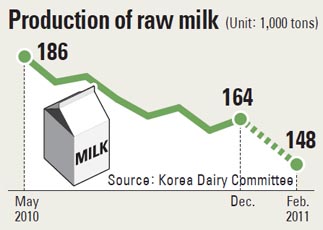
Foot-and-mouth disease breaks out in
http://english.yonhapnews.co.kr/business/2011/02/10/91/0501000000AEN20110210000700320F.HTML
Full text:
FMD, bird flu outbreaks inflict huge damage on
http://english.yonhapnews.co.kr/business/2011/02/09/0501000000AEN20110209010000320.HTML
Summary: Recent nationwide outbreaks of foot-and-mouth disease (FMD) and bird flu are estimated to have cost
Serious concern over pollution at culling sites [English, CSY]
Gov¡¯t orders inspections after report finds contaminated water leakage
http://joongangdaily.joins.com/article/view.asp?aid=2932069
Summary: Amid growing, serious concern over water and soil contamination at the burial sites of animals culled in the foot-and-mouth disease (FMD) outbreak, the government and the ruling party yesterday decided to conduct environmental surveys at all sites nationwide. The Lee Myung-bak administration and the Grand National Party convened a meeting to discuss the serious environmental concerns. The Ministry of Environment and the Ministry of Public Administration and Security will be in charge of the nationwide surveys, said Representative Kim Young-woo. A quick reaction department will be created under the military¡¯s chemical, biological and radiological warfare unit to step up the efforts to contain the problems related to the outbreak of FMD as well as avian influenza. The team will work with civilian and government disease control task forces.
Foot-and-mouth could stutter FTA schedule [English, MGF]
http://www.koreatimes.co.kr/www/news/biz/2011/02/123_81174.html
Summary: As
Rival Camps to Discuss Assembly Resumption[English, MGF]
http://world.kbs.co.kr/english/news/news_Po_detail.htm?No=79403
Ruling and opposition parties will meet Monday for final coordination on the timetable and agenda for normalizing the extraordinary National Assembly session this month. FMD will be discussed.
N.
http://www.koreaherald.com/national/Detail.jsp?newsMLId=20110213000334
Summary:
<A Picture>Dairy dilemma [English, CSY]
http://joongangdaily.joins.com/article/view.asp?aid=2932150
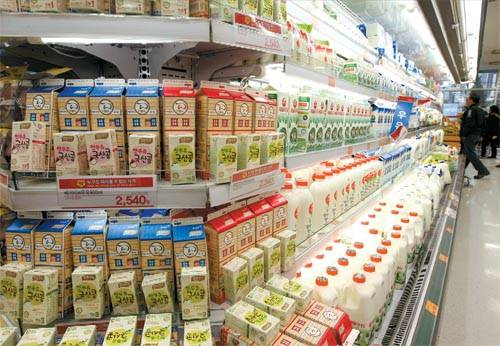
http://joongangdaily.joins.com/article/view.asp?aid=2932062
Summary: The government announced yesterday a range of measures to stabilize the supply of milk, as foot-and-mouth disease and a colder-than-normal winter are causing decreased milk production.
http://english.yonhapnews.co.kr/business/2011/02/13/95/0501000000AEN20110213001500320F.HTML
Full text:
Milk shortage caused by FMD affecting local industries [English, CSY]
http://english.yonhapnews.co.kr/business/2011/02/13/30/0501000000AEN20110213001000320F.HTML
Summary: A nationwide milk shortage caused by the severest foot-and-mouth disease (FMD) outbreak in
Gov¡¯t goes on high alert over FMD contamination [English, CSY]
http://joongangdaily.joins.com/article/view.asp?aid=2932220
Summary: As the public becomes increasingly alarmed over the environmental impact of the mass culling of animals due to foot-and-mouth disease, the government yesterday issued new measures to contain the damage by assigning civil servants to each disposal site for daily inspections. Following reports of water and soil contamination at the disposal sites of culled animals, the Central Disaster and Safety Countermeasures Headquarters said yesterday that it has issued new guidelines to regional governments to survey the sites daily. Under the new measures, public servants will be assigned to each site for daily inspection and for managing the sites to prevent water and soil contamination. Deputy mayors and governors will be in charge of the sites near drinking water sources or those found to be vulnerable to leaks.
Disgust over FMD gives boost to vegetarianism [English, CSY]
http://joongangdaily.joins.com/article/view.asp?aid=2932212
Summary: As worries about foot-and-mouth disease spread, vegetarianism is enjoying new popularity, changing
http://english.yonhapnews.co.kr/business/2011/02/14/0501000000AEN20110214009400320.HTML
Summary:
<2/11/2011>
http://english.yonhapnews.co.kr/business/2011/02/11/48/0502000000AEN20110211009600320F.HTML
Summary:
Measures to fight FMD contamination put in place [English, CSY]
Among actions: sensors at culling sites, water surveys
http://joongangdaily.joins.com/article/view.asp?aid=2932273
Summary: Monitoring devices with automatic sensors will be installed at the disposal sites of animals culled because of foot-and-mouth disease as a part of government efforts to manage snowballing health and environmental concerns. Minister of Public Administration and Security Maeng Hyung-Kyu, Minister for Food, Agriculture, Forestry and Fisheries Yoo Jeong-bok and Minister of Environment Lee Maan-ee jointly held a press conference yesterday announcing the government¡¯s comprehensive measures to prevent environmental damage from the mass culling of farm animals.
Additional FMD case found in central
http://english.yonhapnews.co.kr/business/2011/02/15/37/0501000000AEN20110215004900320F.HTML
Summary:
Mistaken Virus Introduction Theory Leaves Blame on Innocent Farmers; Lee government
http://english.khan.co.kr/khan_art_view.html?artid=201102151529407&code=710100
Summary: It has emerged that the foot-and-mouth disease (FMD) virus that first broke out in Andong,
According to the report, government authorities gathered FMD samples for genetic testing from Waryong-myeon in
http://news.khan.co.kr/kh_news/khan_art_view.html?artid=201102151424111&code=920401
Summary: Volume of
http://news.khan.co.kr/kh_news/khan_art_view.html?artid=201102152136105&code=920100
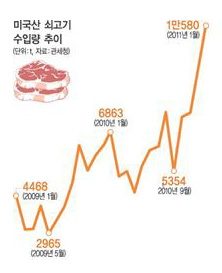
Pork wholesale prices mark 6,703 won [Korean: BYK]
http://www.hankyung.com/news/app/newsview.php?aid=2011021598061
Summary: Average pork wholesale prices marked 6,703 won/kg. on Feb. 15th. This is an increase of 9.3 percent (570 won) in a matter of one week. The pork wholesale prices stabilized after the Korea Swine Association announced that they would maintain the pork prices at 6,500 won/kg or lower. Pork prices reached historical high level of 8,372 won/kg. on Jan. 26 but had dropped to 6,072 won on Feb. 1, after the announcement by the association on Jan. 31.
Inadequate Response to "Environmental Pollution" Caused by FMD Burials Is Deeply Worrisome [English, CSY]
http://english.khan.co.kr/khan_art_view.html?artid=201102161525307&code=790101
Summary: An investigation by Gyeonggi Province of 1844 foot-and-mouth disease (FMD) burial sites has revealed that around 17% are close to waterways, near the region of the source of the Namhan River at Paldang Water Purification Plant, or near steep gradients. In this way, mass livestock burials have taken place at sites fundamentally unsuited to the purpose. The investigation showed, moreover, that supplementary facilities were necessary due to ground subsidence in 47% of cases, inadequate waterways or reservoirs in 56% of cases, and inadequate leachate piping in 45% of areas. Inadequacy is to be found everywhere.
We can guess at the total lack of planning behind the burials, with proper guidelines far from being observed. And we cannot help but worry about environmental disasters as a consequence of this. Still more shocking is the fact that the result of investigations of 831 water samples taken from the vicinity of burial sites in Gyeonggi show 27.4% of them to be unsuitable for drinking. This gives rise to concern that water pollution may already be widespread. Despite this reality, the government and ruling party continue to insist that media reports have been exaggerated and that there is nothing to worry about.
Seoul to raise tariff quotas on pork, powdered milk [English, CSY]
http://english.yonhapnews.co.kr/business/2011/02/18/89/0501000000AEN20110218005300320F.HTML
Summary:
http://english.yonhapnews.co.kr/business/2011/02/18/55/0501000000AEN20110218003500320F.HTML
Summary:
Cleanup work begins at Gyeonggi FMD burial sites [English, CSY]
Waste water being extracted in effort to lessen pollution
http://joongangdaily.joins.com/article/view.asp?aid=2932550
Summary: Amid growing fears that the millions of animals buried due to foot-and-mouth disease (FMD) will contaminate underground water sources, the Gyeonggi Provincial Government yesterday began extracting waste water from burial sites in Namyangju and Yangpyeong. As of yesterday, roughly 3.3 million animals nationwide have been culled and some 700,000 of them have been buried at 2,017 sites in Gyeonggi, according to the central government. There are about 4,130 burial sites nationwide.
Imports of pork and powdered milk to be raised [English, CSY]
http://joongangdaily.joins.com/article/view.asp?aid=2932424
Summary:
S. Korean imports of
http://english.yonhapnews.co.kr/business/2011/02/22/17/0501000000AEN20110222000900320F.HTML
Summary:
Vaccines could have stopped FMD [English, CSY]
But government was preoccupied with maintaining vaccine-free status
http://joongangdaily.joins.com/article/view.asp?aid=2932488
Summary: To protect less than $2 million worth of meat exports, the government has turned the country into a massive graveyard of farm animals. Since foot-and-mouth disease broke out in November, more than 3.3 million cows and pigs have been slaughtered, livestock farmers have suffered emotionally and the country is stuck with a bill of trillions of won to compensate farmers for culled animals. Much of this could have been avoided if the government had chosen the more effective and less costly solution of vaccination instead of killing cattle and pigs. But when vaccinations are used, the country loses its vaccine-free status, which makes its meat exports less desirable.
FMD-related damages hover around 3 tln won: farm minister [English, CSY]
http://english.yonhapnews.co.kr/business/2011/02/24/0501000000AEN20110224011000320.HTML
Summary: Damages caused by the severest foot-and-mouth disease (FMD) outbreak in
PM blames climate, FMD for inflation [English, CSY]
http://www.koreatimes.co.kr/www/news/nation/2011/02/113_82031.html
Summary: Prime Minister Kim Hwang-sik countered the allegation Thursday that a misguided monetary policy was responsible for soaring prices, saying inflation is a combined result of climate change, foot-and-mouth disease (FMD) and other non-policy factors. During the National Assembly¡¯s interpellation session, Kim vowed to curb inflation by lowering tariffs and taking other necessary policy measures. But opposition party lawmakers, including Rep. Park Byeong-seug of the main opposition Democratic Party (DP), urged him to take firmer action. They called for replacing Cabinet ministers responsible for an allegedly wrong policy package, if necessary.
S. Korea to expand tariff quota on powdered milk, pork belly [English, CSY]
http://english.yonhapnews.co.kr/business/2011/02/28/25/0502000000AEN20110228002500320F.HTML
Summary:
A tariff quota is a quantitative threshold on imports, above which a higher tariff is applied. The lower tariff rate applies to imports within the quota, allowing policymakers to adjust duties on specified merchandise to help control inflationary pressure. Under the latest decision, the government will impose no import duties on 30,000 tons of powdered milk until the end of this year. It earlier sought to apply the tax exemption to 9,000 tons of the product by the end of June.
GNP demands dismissal of farm minister over FMD spread [English, CSY]
http://english.yonhapnews.co.kr/national/2011/02/28/21/0301000000AEN20110228001700315F.HTML
Summary: The Grand National Party (GNP) has formally asked President Lee Myung-bak to sack his farm minister over one of the worst outbreaks of foot-and-mouth disease here, party officials said Monday, as the ruling party struggles to woo voters ahead of the April 27 by-elections. The demand was delivered to presidential aides in their regular policy coordination meeting with officials at the GNP and the government on Sunday. "Participants from the GNP requested that the minister for food, agriculture, forestry and fisheries, Yoo Jeong-bok, take responsibility, as the foot-and-mouth problem has abated somewhat," a senior GNP official told Yonhap News Agency by phone, requesting anonymity.
Fresh bird flu strain confirmed in southern area [English, CSY]
http://www.koreatimes.co.kr/www/news/nation/2011/02/113_82126.html
Full text: About 1,000 ducks found dead earlier this week at a farm in southern
Convenience Stores Offer Aggressive Promotions Targeting Valentine Day [Korean, OSY]
http://www.yonhapnews.co.kr/economy/2011/02/08/0318000000AKR20110208081300003.HTML
Summary: Major convenience store chains have announced various promotional events targeting Valentine Day (February 14), which has emerged as one of the top three shopping seasons to convenience stores along with White Day (March 14) and PaePaeRo Day (Nov. 11). Most common promotional tools announced was lottery type events that can win free trips and free gifts.
Asahi Beer Sold 1 Million Cases in
http://www.yonhapnews.co.kr/economy/2011/02/09/0318000000AKR20110209078700003.HTML
Summary: Lotte Asahi, a leading importer of alcohol beverages, reported that the sales of Asahi beer that it imported from
GS Supermarket to Strengthen Internet Store [Korean, OSY]
http://www.yonhapnews.co.kr/economy/2011/02/09/0318000000AKR20110209062900003.HTML
Summary: GS Supermarket, a leading grocery supermarket chain, announced on February 10 that it has launched a new internet store site to strengthen the on-line business. Its new internet supermarket (www.gsisuper.co.kr) offers twice more products than its old internet store, which covers over 90 percent of the products sold in its conventional stores. The new store also features speedier home delivery service. Orders placed before 6:00 p.m. will be delivered within 3 hours. Same day delivery service is provided to the entire
CJ O Shopping to Enter
http://www.yonhapnews.co.kr/economy/2011/02/09/0318000000AKR20110209055700003.HTML
Summary: CJ O Shopping, a leading TV home shopping company in
Fair Trade Committee to Introduce ¡®Fair Trade Bill on Large-scale Retail Business¡¯ [Korean, OSY]
Summary: In a meeting between the Fair Trade Committee and the presidents of 9 leading retail companies held on February 9, committee chairperson Dongsoo Kim announced that the government plans to introduce a new bill that intends to regulate the way large-scale retailers transact with suppliers. According to Mr. Kim, the bill are likely to include key ¡®fair trade measures¡¯ such as limiting of returning unsold products to the suppliers and 40 day payment due. Presidents of retail companies expressed concerns at the meeting. Mr. Kim also added that the committee will disclose the distribution mark up taken by large retailers every six months.
Drink with Straw ¡¦ Small Volume, Low Alcohol Wines Get Popular [Korean, OSY]
http://news.donga.com/Economy/Market/3/0108/20110211/34760385/1
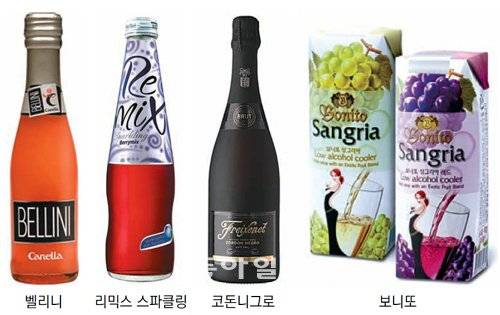
Large Volume Packages Lead Sales Growth of On-line Grocery Retailers [Korean, OSY]
http://www.yonhapnews.co.kr/economy/2011/02/13/0318000000AKR20110213051600003.HTML?audio=Y
Summary: According to G-Market, a leading on-line grocery open market provider in
Number of Korean Women with Job to Reach 10 Million Soon [Korean, OSY]
http://www.yonhapnews.co.kr/economy/2011/02/14/0301000000AKR20110214166000002.HTML
Summary: Ministry of Women & Family reported that the number of women with job reached 9.9 million in
Lotte Department Store to Reduce Sales Mark-up by 1 to 5 Percent [Korean, OSY]
http://www.yonhapnews.co.kr/economy/2011/02/14/0302000000AKR20110214208800003.HTML
Summary: Lotte Department Store, the leading department store chain in
Entry of SSM into a Traditional Market Zone Denied for the First Time [Korean, OSY]
http://www.yonhapnews.co.kr/economy/2011/02/15/0318000000AKR20110215069800055.HTML
A plan to open a Super Supermarket (SSM) store in Gimje city (Junbook province) was denied by the city government based on the Retail Industry Development Act introduced in November 2010. The act prohibits opening of stores by large-scale retailers within 500 meters from designated ¡®traditional market zones¡¯. This was the first case that the act made a real effect and is likely to be reflected on pending cases in other cities.
Import Price of Coffee Beans Up 15% So Far This Year [Korean, OSY]
http://www.hankyung.com/news/app/newsview.php?aid=2011021596601&sid=010502&nid=005<ype=1
Summary: Price of coffee beans in NY Commodity Exchange Market hit a 13.6 year high on Feb. 14. The price of Arabica beans rose 2.6 percent on Feb. 14 to mark 258.6 cent per pound in the market. According to leading importers, import price of coffee beans has surged by 15 percent so far this year.
Fishflation - High price of Fisheries cause inflation in
Summary: seafood price recorded historical high these days and even expected to go up more, mainly due to limited supplies and increased consumption.
Agflation -
Summary:
Volume of food imports skyrockets amid severe shortages [English, CSY]
http://english.donga.com/srv/service.php3?bicode=020000&biid=2011021828438
Summary: With the prices of agricultural and fishery products skyrocketing in the wake of the cold spell, heavy snow and the spread of foot-and-mouth disease, imports of these products have dramatically increased since early this year. The stop-gap measure seeks to stabilize prices but is not a fundamental solution to inflation, which could last until the end of the year.
S.
http://english.yonhapnews.co.kr/business/2011/02/21/0502000000AEN20110221004600320.HTML
Summary:
Domino Pizza
http://news.khan.co.kr/kh_news/khan_art_view.html?artid=201102222115185&code=990101
Summary: Domino Pizza
¡°Ashuly Seeks to Become the Leading Restaurant Chain in
http://news.donga.com/Economy/Market/3/0108/20110222/35041418/1
Summary: K.Y. Hong, president of Ashuly, the restaurant business arm under E. Land Retail Group, said in a press interview on Feb. 22 that Ashuly would continue an aggressive expansion through the coming year by adding 50 new outlets within 2011 alone. Mr. Hong added that the expansion goal for this year should make Ashuly the largest restaurant chain in
Koreans
http://www.arirang.co.kr/News/News_View.asp?nseq=112965&code=Ne2&category=2
Full text: A new survey shows that more than half of Korean consumers prefer domestic food products to imported ones. The Korea Chamber of Commerce survey of 1,5-hundred people conducted last year found that nearly 54-percent of respondents would buy Korean food products rather than imported ones even when the price of Korean-made food is high. Around 31-percent said that it would depend on the item, while only 15-percent said that they had no preference. Despite the chamber
Jonny Rockets to Open its First Store in
http://www.yonhapnews.co.kr/economy/2011/02/24/0318000000AKR20110224065600003.HTML
Jonny Rockets, an American premium hamburger restaurant chain, will open its first store in
Food materials sector bears the brunt [English, CSY, MJF]
[NEWS IN FOCUS] Government policy prevents companies from raising prices, causing massive losses
http://joongangdaily.joins.com/article/view.asp?aid=2932788
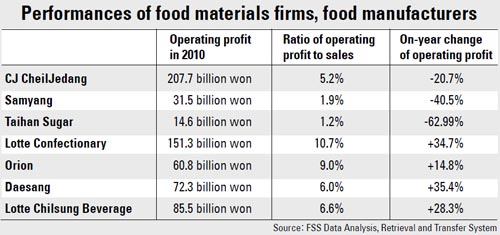
Mixed Feed Price Soars as High as 8.1 Percent [Korean, OSY]
http://www.hankyung.com/news/app/newsview.php?aid=2011022534931&sid=0104&nid=004<ype=1
Summary: Local suppliers of mixed feed products for cattle and swine have increased the retail prices as high as 8.1 percent in February. Suppliers explained that the price increase was due to the rising price of raw ingredients, including corn, wheat, and soy meal, in the international market.
Local Retailers in Price War with Fresh Octopus Imported from
http://www.hankyung.com/news/app/newsview.php?aid=2011022534241&sid=0104&nid=004<ype=1
Summary: While leading department stores and hypermarkets have launched sales promotion around fresh octopus imported from
Rice aid in NK`s black markets (English, CSY)
http://english.donga.com/srv/service.php3?biid=2011020738898
Summary: The liberal Kim Dae-jung and Roh Moo-hyun administrations of
John Everard, who served as British ambassador to
Will US resume food aid to NK? [English, CSY]
http://www.koreatimes.co.kr/www/news/nation/2011/02/113_81017.html
Summary: The
The
http://news.chosun.com/site/data/html_dir/2011/02/06/2011020600102.html
http://english.yonhapnews.co.kr/national/2011/02/13/38/0302000000AEN20110213002600320F.HTML
Summary:
http://world.kbs.co.kr/english/news/news_IK_detail.htm?No=79401
FT: Inflation, Food Shortage Threatening NK Regime [English, MGF]
http://world.kbs.co.kr/english/news/news_IK_detail.htm?No=79387
The Financial Times says that
WFP, FAO Launch Food Inspection in NK [English, MGF]
http://world.kbs.co.kr/english/news/news_IK_detail.htm?No=79385
The Voice of America (VOA) is reporting that
Gov
http://english.yonhapnews.co.kr/business/2011/02/06/3/0501000000AEN20110206003100320F.HTML
Summary:
Carbon credit system won¡¯t be too rigid, says Lee [English, CSY]
http://joongangdaily.joins.com/article/view.asp?aid=2931904
Summary: President Lee Myung-bak said yesterday that a carbon-emissions trading system will be pursued flexibly, a potential sign of retreat from the centerpiece of his green growth strategy. ¡°We¡¯ll fully reflect the opinions of the business community when we introduce carbon emissions trading,¡± Lee said in a biweekly radio address yesterday. ¡°The government will implement the system in a flexible manner reflecting international trends and the industrial competitiveness of the country. ¡°There are concerns that reducing greenhouse gas emissions could place an extra burden on our economy.¡± But Lee also said that the system¡¯s introduction is inevitable. ¡°If we have to walk the path, we¡¯d better do it faster than others,¡± he said.
Lee suggests creation of task force on food crisis [English, CSY]
http://english.yonhapnews.co.kr/business/2011/02/07/0502000000AEN20110207003800315.HTML
Summary: President Lee Myung-bak said Monday that
Environmental disaster [English, CSY]
http://www.koreatimes.co.kr/www/news/opinon/2011/02/137_80940.html
Summary:
The minister warns the economic, social, cultural and environmental damage of the haphazard burials is beyond anybody¡¯s imagination. Koreans might face unprecedented water contamination. Once spring comes, the frozen underground corpses may melt, and the culled animals will start to rot. This will inevitably contaminate water and farming land, and ultimately damage the people. Downpours and floods will wash away the burial mounds and the decayed animals.
Busan Fishery Auction Market Set a Record High
http://www.yonhapnews.co.kr/economy/2011/02/08/0318000000AKR20110208081300003.HTML
Summary: Busan Fishery Auction Market reported that the auction sales in January 2011 amounted to W55 billion (22,263 tons), a record high since 1969. The surge of sales was mainly due to a good catch of squid from near sea water.
http://www.koreaherald.com/national/Detail.jsp?newsMLId=20110208000717
Summary: The
Carbon trading plan losing momentum [English: BYK]
http://www.koreaherald.com/business/Detail.jsp?newsMLId=20110208000882
Summary:
Democratic Party states that it will normalize the operation of the National Assembly in February [Korean: BYK]
http://www.sisaseoul.com/news/articleView.html?idxno=37484
Summary: Ji Won Park, Floor Leader for the Democratic Party, stated that he would try to get the National Assembly to normalize its operation I February so that the pending bills can be addressed. However, he made this comment under the condition that the President and the Speaker of the National Assembly need to show some kind of sincerity regarding the 2011 budget that was approved unilaterally by the ruling party in December 2010.
¡®Gim¡¯ Seaweed Production in
http://www.yonhapnews.co.kr/economy/2011/02/08/0318000000AKR20110208189700054.HTML
Summary: Korea Maritime Institute
CJ Group makes headway overseas [English, CSY]
http://joongangdaily.joins.com/article/view.asp?aid=2932002
Summary: Two subsidiaries of CJ Group have established footholds in foreign markets as part of the group¡¯s push to increase its global presence. CJ Cheiljedang, the leading food and bio-product manufacturer, announced yesterday that it has signed a deal to supply instant steamed rice and other food products to Costco
Farm subsidy fraud [English, CSY]
http://english.donga.com/srv/service.php3?biid=2011021112888
Summary: The government spent more than 127 trillion won (113.34 billion dollars) for agriculture in the form of subsidies or loans from 1992 through 2007. Despite the huge investment, Korean agriculture is still globally uncompetitive, and farmer incomes have risen little. This is the failure of agricultural populism in ignoring economic efficiency for the sake of political considerations. Moral hazard, waste, corruption and collusion are closely related to farm subsidies. Only about five percent of farmers are estimated to benefit from subsidies or low-interest loans. Certain farmers care nothing about farming but are busy lobbying and entertaining government officials who have the authority to allocate subsidies. That is why farmers deplorably say, ¡°Do you farm at a waterhole or a cafe?¡±
S. Korea,
http://english.yonhapnews.co.kr/business/2011/02/14/17/0501000000AEN20110214000900320F.HTML
Full text:
http://www.koreaherald.com/national/Detail.jsp?newsMLId=20110215000635
Summary:
The ruling and opposition party agree to open the National Assembly [Korean: BYK]
http://www.mjknews.com/news/articleView.html?idxno=42719
Summary: The ruling and opposition party agreed to hold a temporarily session from February 18th through March 12th to work on the 38 bills directly related to the livelihoods of the public that have been pending at the floor level. They will also look into creating 5 new special committees within the National Assembly and then call in Cabinet members from Feb. 24th through March 2nd to hold a Q&A session.
Overseas coffee exporters eye
Companies look to hook up with Korean partners during trade show
http://joongangdaily.joins.com/article/view.asp?aid=2932376
Summary:
http://www.arirang.co.kr/News/News_View.asp?nseq=112866&code=Ne2&category=2
Full text:
Korea Trails Developed Nations in Food Security [English, CSY]
http://english.chosun.com/site/data/html_dir/2011/02/21/2011022101221.html
Summary:
http://www.koreatimes.co.kr/www/news/biz/2011/02/123_81751.html
Summary: Koreans have time-honored beliefs that misfortune never comes alone ¡ª they tend to believe that the worst-case scenario is when three disasters devastate all involved. That seems to be the case for domestic farmers this winter when three catastrophes happened with the rapid spread of foot-and-mouth disease (FMD), avian influenza, and heavy snowfall creating the perfect storm. The triple woes are likely to negatively affect the
According to the Korea Agro-Fisheries Trade Corp. (aT), the price of pork rocketed by 37.9 percent from a year ago as of the end of last week. That of chicken also jumped 24.5 percent over the same period. With the appreciation of meat values due to the two rampant diseases, consumers have been prompted to turn to seafood and the increased demand has also caused similar price hikes. For example, the price of mackerel has leapt 42 percent from a year ago.
Price of seafood has skyrocketed [English, CSY]
Nearly 50 percent increase noted
http://joongangdaily.joins.com/article/view.asp?aid=2932584
Summary: As the cost of fresh produce continues to climb, the prices of widely consumed seafood such as squid, mackerel, yellow corvina and hairtail have all risen by up to nearly 50 percent, putting a further strain on citizens¡¯ pocketbooks. Experts point to a domino effect from a shrunken meat supply due to foot-and-mouth disease driving up demand for seafood, plus unusually low temperatures in both the East and
Gov¡¯t sets sights on renewable energy [English, CSY]
http://joongangdaily.joins.com/article/view.asp?aid=2932591
Full text:
Imported Seafood Takes over Dining Table due to Fish-flation [Korean, OSY]
http://news.donga.com/Economy/Market/3/0108/20110223/35073620/1
Summary: A recent visit to Noryangjin Fishery Market revealed that imported seafood accounted for much of the seafood supply in
Carrefour
http://www.hankyung.com/news/app/newsview.php?aid=2011022345591&nid=000<ype=1
First
http://joongangdaily.joins.com/article/view.asp?aid=2932790
Summary: Yesterday morning, 1,200 participants started tasting and viewing expensive single malts and blends from nearly 50 whiskey brands. Glitzy and sleek booths displayed spirits that definitely skewed toward the high-end, ranging from 12 to 35 years old.
The information in this report was compiled by the Agricultural Trade Office (ATO) at the U.S. Embassy in Seoul, South Korea. The press summaries contained herein do NOT reflect USDA, the U.S. Embassy, or other U.S. government agency official policy or view point. U.S. food exporters can learn more about market opportunities in South Korea by reviewing ATO Seoul¡¯s Exporter Guide and other reports available at www.fas.usda.gov by clicking on ¡°attaché reports¡±.
Agricultural Trade Office, U.S. Embassy - Seoul
Tel: 82-2-6951-6848 Fax: 82-2-720-7921
Email: atoseoul@usda.gov